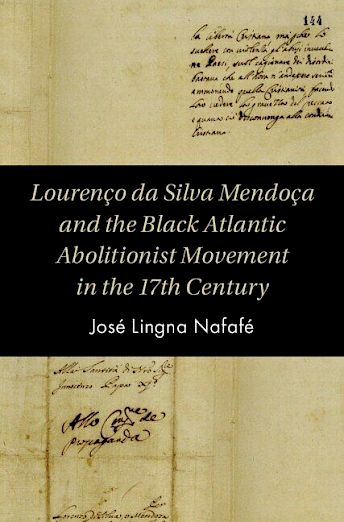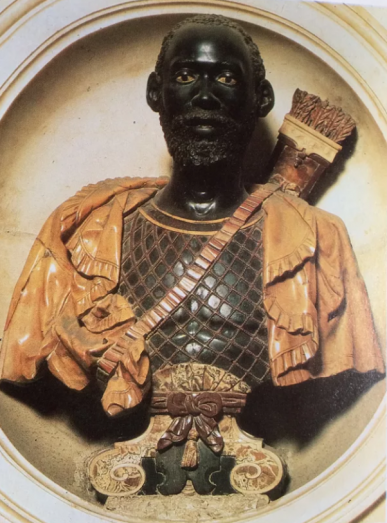REVIEW: Lourenço da Silva Mendonça and the Black Atlantic Abolitionist Movement in the Seventeenth Century

Jose Lingna Nafafé, Lourenço da Silva Mendonça and the Black Atlantic Abolitionist Movement in the Seventeenth Century (Cambridge: Cambridge University Press, 2022).
Reviewed by Michael Aidan Pope
In this monograph Dr José Lingna Nafafé of the University of Bristol uses the figure of Lourenço da Silva Mendonça, a member of the Ndongo royal family, as a means of disrupting the history of slavery abolition. Exiled from his homeland in Angola in December 1671, Mendonça was sent to Brazil and then Portugal, before finally heading to the Italian Peninsula in 1684, via Spain, to present his case against the trans-Atlantic trade of enslaved people. And this court case, in which Mendonça called for the abolition of slavery, is the central focus of the text, what Lingna Nafafé sees as the culmination of the seventeenth century ‘Black Atlantic Abolition Movement.’
In this regard, one of the text’s most revelatory discoveries is that of the baculamento in 1626, a tax to be paid in enslaved people, implemented by the Portuguese, which replaced the earlier encombros, a tax paid in produce. It was the implementation of such measures that led Mendonça’s family to publicly challenge the Portuguese Atlantic slave trade, which in turn brought about their exile, after a failed military uprising. As a result, Mendonça was first sent to Salvador in Brazil, before being moved to Sao Paulo because of fears that he and his family might become allies of the inhabitants of Palmares, a community based not far from the city of Salvador which was organised by both Blacks who had escaped their enslavers and Blacks born free in Brazil. Indeed, the majority of the formerly enslaved Africans living in Palmares had come from Mendonça’s home region in Angola, and Lingna Nafafé shows that not only was Mendonça and his family known to some of the inhabitants of Palmares, but they also spoke the same language, Kimbundu. Thus, to prevent any solidarity forming between the exiled royalty and the inhabitants of Palmares, Mendonça was moved further south.
Mendonça was later sent to Portugal, where he stayed at the monastery of Vilar de Frades, a traditional destination for the education of African and Amerindian students. Later he travelled to Lisbon, where he met the Converso Gasper da Costa Mesquita, an apostolic notary who gave him a letter of reference for the Vatican. Mendonça then went to Toledo in Spain, where he was eventually appointed a procurator, and forged relationships with the city’s Amerindian community. Whilst there, he was also made an attorney general by King Carlos III for the confraternity of the Rosary of Our Lady of Star for the Black Man: an international role which transcended frontiers to include Portugal, Spain, Brazil, and the colonies in Africa and Asia. Mendonça now represented the confraternities of Black men in four continents: Africa, America, Asia, and Europe. Thus, as a consequence of his 13 years in exile, and all the people he had met, Mendonça had developed an argument for a universal claim for liberty, not just for enslaved Blacks, but also Amerindians and Conversos. A trans-Atlantic fight for universal liberty.
This fight was brought to the Vatican on the 6th of March 1684, where Mendonça placed the blame for the slave trade at the feet of the Vatican, the governing authorities of Italy, Portugal, Spain, and Christian slave merchants, for their involvement in the Atlantic slave trade. Lingna Nafafé argues that the evidence brought to the Vatican had probably been prepared over many years, with the help of the brotherhoods of enslaved and freed Blacks in Brazil, Portugal, and Spain, and Conversos like the aforementioned Gasper da Costa Mesquita, who had supported Mendonça’s efforts to defend their rights and protest against their treatment. Importantly, Mendonça and his supporters all argued that the Vatican was the mens rea (the guilty mind) because it had passed the bulls permitting enslavement. And whilst it was argued that the Christianity of enslaved Africans was not being taken into account with regard to their mistreatment, in his final appeal, Mendonça also delivered a message of liberation for all, regardless of religious affiliation: whether “Jews, pagans, or Christians.” Indeed, Lingna Nafafé states that what was being argued for was the complete abolition of the Atlantic slave trade well, well over a century before the efforts of William Wilberforce and the rest of the abolitionists of the European Enlightenment.

Yet, I have yet to be fully convinced that through the court case “Mendonça was calling for the revitalisation of the inclusive principles that emerged from the Council of Trent.” At no point during the Council of Trent was there any mention of proselytising in the Americas or the wider Iberian Atlantic world, so I don’t yet understand where a concept of inclusive Catholicism, as argued by Lingna Nafafé, could emerge from. I make this point, not to undermine the work of Lingna Nafafé, which is without question fantastic, but rather because his claim that there existed “inclusive principles” interests me greatly, for my own research focuses on the many conversions to Catholicism in the early modern Iberian Atlantic.
The above point aside, having read and deeply enjoyed Lingna Nafafé book, I place him alongside the likes of Cécile Fromont (The Art of Conversion: Christian Visual Culture in the Kingdom of Kongo), Herman L. Bennett (African Kings and Black Slaves: Sovereignty and Dispossession in the Early Modern Atlantic), Larissa Brewer-García (Beyond Babel: Translations of Blackness in Colonial Peru and New Granada), and Miguel Valerio (Sovereign Joy: Afro-Mexican Kings and Queens, 1539-1640), in creating works that highlight both the agency, and the centrality, of Black individuals and Black communities, and thus Black histories, in the construction of the early modern Atlantic world.
Additionally, Lingna Nafafé also provides evidence that both Carlos II of Spain and Pedro II of Portugal “made a concerted effort to abolish slavery in the seventeenth century” because of Mendonça’s case, only to be halted by the economic logic of the day. Indeed, Antonio Vieira’s response to a letter from Pope Innocent XI in 1689, referenced within this book, best summarizes this economic rationale. After being asked by the Pontiff to take the “blessings of Christ to Palmares,” the aforementioned community in Brazil organised by runaway slaves, Vieira refused Innocent XI’s wishes. The Jesuit justified his actions on the grounds that the continued existence of Palmares could lead to “the total destruction of Brazil, since the other blacks knowing that through this means they could be free, would soon become other Palmares, fleeing and going to the forests with all their stock, that is nothing more than their own body.” Indeed, within five years of the sending of this letter, Palmares had been totally destroyed. Just as Mendonça’s attempt to create a different Atlantic world was ultimately quashed by opposing imperial interests, so too were the ambitions of the inhabitants of Palmares. Yet, throughout his work, Lingna Nafafé highlights the importance of studying these struggles, even if they failed.
Much of the work in this prodigiously researched and referenced book is newly retrieved from 36 archives across six countries—Angola, Brazil, Portugal, Spain, Italy, and the UK. The resulting depth of its revelatory scholarship, as well as its engagement with the wider historical canon, makes it essential reading for anyone working in the Early Modern Iberian Atlantic world, as well as those interested in histories of abolition and the Black Atlantic more broadly.